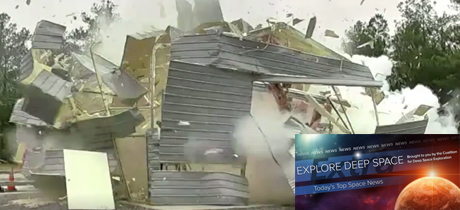Subscribe to our Daily Newsletter:
Don’t miss the latest developments in space policy, science, and exploration with Deep Space Extra, delivered directly to your inbox from Monday to Friday.
|
|
Here is a list of news that were published in our Newsletter the week of March 19, 2023:
Human Space Exploration:
- First crewed Starliner launch slips again
- Boom! Sierra Space blows up final inflatable space station module in initial test series (video)
- Nelson details “devastating” impacts if NASA funding capped at FY2022 level, or less
- Artemis II Moon rocket coming together ahead of 2024 astronaut launch (photo)
- Astronauts that hibernate on long space flights not just for sci-fi. We could test it in 10 years
- Russia, China to maintain cooperation in manned space missions
- Russia’s space program is in big trouble
- 1st map of Moon water could help Artemis astronauts live at the lunar south pole
- Here’s where Artemis III might land. It looks inviting
- Industry sees missed opportunity in deorbiting ISS
- New launch date announced for world’s first 3D-printed rocket from Florida
Space Science
- Fox urges science community to stick together amid budget pressures
- Severe geomagnetic storm
- The discovery of a hot Neptune that shouldn’t exist
- Mars helicopter Ingenuity aces 48th flight on the Red Planet
- James Webb Space Telescope spies hot, gritty clouds in skies of huge exoplanet with 2 suns
- Asteroid as large as 300 feet wide to fly in between Earth and the Moon this week
- Big asteroids hit Earth more frequently than thought, study suggests
- Japanese lander enters lunar orbit
- A crucial building block of life exists on the asteroid Ryugu
- Europa Clipper: A guide to NASA’s new astrobiology mission
- A large hole in the Sun’s atmosphere
- Mars Sample Return cost growth threatens other science missions
- Martian soil may have all the nutrients rice needs
- NASA weighing continuing VERITAS versus future Discovery mission
- Europe’s exoplanet-hunting CHEOPS mission extended through 2026
Opinion
- How will we know when we win the new space race?
- Mars exploration and the debate about planetary protection
Other News
- Europe risks being ‘a spectator in next space race’
- Russia launches Soyuz-2.1a rocket with military satellite
- Virgin Orbit begins “incremental” return to work as it seeks new funding
- Astronaut Sultan Al Neyadi sees 16 sunsets daily on the Space Station. How will he observe Ramadan?
- 3-D printed rocket blasts off, withstands rigors of launch but fails to reach orbit
- South Korea’s Innospace succeeds in test launch
- Kazakhstan’s seizure of Russian space assets threatens the Soyuz-5 rocket
- Arkisys and partners to show how they would build a satellite in orbit
- Virgin Orbit pauses all operations
- ULA, SpaceX and Rocket Lab see big launch year ahead
Major Space Related Activities for the Week
- This week marks the 40th anniversary of the late President Ronald Reagan’s introduction of the Strategic Defense Initiative (SDI), a non-nuclear layer of space defenses intended to protect the U.S. and its allies from Soviet nuclear missiles. Controversial, technically challenging and expensive, the SDI would go on to become the Ballistic Missile Defense Organization and later the current Missile Defense Agency. The Hudson Institute is hosting a webinar marking the anniversary on Monday from 10 a.m. to 11 a.m. EDT. On Friday, the Center for Strategic and International Studies will host “Missile Defense at 40” from 9 a.m. to 4 p.m. EDT, which will be livestreamed as well.
- Bhavya Lal, NASA’s associate administrator for the Office of Technology, Policy and Strategy will speak on Tuesday at 5 p.m. EDT, at George Washington University in honor of Allan Brompley, a former assistant to U.S. president for science and technology. Lal will speak on international and policy challenges and opportunities related to the NASA led Artemis initiative. It will be available over Zoom.
- Bob Cabana, NASA’s associate administrator, will speak before a George Washington University Space Policy Institute and Universities Space Research Association (USRA) seminar on Thursday from 1 p.m. and 5 p.m. EDT, on how cislunar capabilities can contribute to science, commerce and security.
- Jim Reuter, NASA’s associate administrator for space technology, will join a STIGUR space technology roundtable to speak on the agency’s 2024 budget request for space technology. A two-part panel discussion is to follow to discuss advanced nuclear thermal propulsion and NASA’s agreement with the Defense Advanced Research Project Agency to demonstrate DRACO, a nuclear rocket for cislunar operations.
- The U.S. House and Senate will be in session for part of the week.

